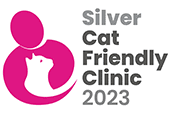Infectious Bronchitis – otherwise known as ‘Kennel Cough’, is a very contagious disease of the respiratory system, which can affect dogs of any age. At best it is somewhat uncomfortable and in extreme rare occasions can be fatal. The disease is caused by a mixture of viruses and bacteria, which pass easily from dog to dog as a droplet infection, wherever dogs congregate – in boarding kennels, dog shows, training classes, or simply out on walks. Unfortunately a wet, warm summer and winter will allow kennel cough to flourish so conditions at the moment are ideal for the bacteria to grow and spread. Kennel Cough needs to be treated early to avoid it giving rise to more serious health concerns. Coughs can also be transferred so owners should avoid their pet coming into contact with other animals to prevent the spread of the disease. Boarding Kennels for example will not take an animal with Kennel Cough and this is one of the reasons that they will ask to see that your pet’s vaccinations are up to date on arrival. With the summer holidays just around the corner and many people intending to put their pets into kennels, now is a good time to check your pet is fully vaccinated and that boosters are up to date.
What are the Symptoms The easiest symptom to spot is a hacking cough. This is different to a human cough & may sound like a dry, vomiting-like type of cough. It is a sound that resonates inside the dog’s body frame. When you listen to it, you may think the dog is going to vomit at any minute. Another symptom is phlegm. If your dog emits phlegm and is producing a gagging sound from its throat, then it is almost certainly suffering from kennel cough. You can easily check where your dog sleeps for signs of phlegm or yellow-like discharges. However, there are times that your pet has a dry cough and that won’t produce phlegm. Your dog may still have an infection though and this will need to be seen to immediately. A third symptom is fever, and if the coughing is combined with this, then it is extremely likely that your dog is suffering from the worst case of the disease and it is essential you take it to a vet for immediate treatment. On arrival you should advise reception of your concerns so that precautions can be taken to avoid contact with other animals in the waiting area.
Prevention & Treatment It is important that if you think your dog is suffering from this disease that you take it to the vet as soon as possible to alleviate the discomfort & reduce the risk of it spreading. Your vet will likely treat it with antibiotics and anti – inflammatories. The decision of whether to use cough suppressants is controversial. The reason an affected dog is coughing is to stop the infection going onto the lungs so generally cough suppressants are not recommended. However, if the cough is really debilitating a suppressant may be prescribed. As always though, prevention is better than cure. Some dogs can be prone to developing kennel cough and for these dogs in particular, it is important that owners take extra care to prevent it. Ensuring that vaccinations and boosters are up to date will greatly reduce the risk of your dog getting kennel cough and other diseases. Spotting Kennel Cough in the early stages can prevent a lot of discomfort for your dog and reduce the risk of infecting others. Treatment is also easiest in the early stages and the cost to you will also be reduced. To help prevent Kennel Cough you need to be aware of other dogs yours is associating with, and look out for symptoms in others. As much as possible you should keep your dog away from strays, since they have no one looking out for their health care. If you think your dog may have kennel cough then isolate it from other pets temporarily and contact your vet so that a quick diagnosis can be made. Although we said at the start of this article that Kennel Cough can be fatal, this is rare and is usually restricted to very young pups or very old dogs with pre-existing chest problems.
Remember….
- Prevention is better than cure so regular check-ups and vaccinations are important.
- If you suspect your dog is infected then keep it away from other animals & contact your vet immediately.
- Early intervention will reduce the discomfort for your dog, make treatment easier & reduce the cost to you.
- Kennels will not take a dog with Kennel Cough and will want to see that vaccinations are up to date.





